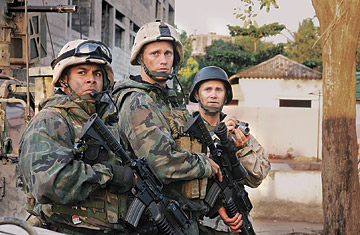
John Huertas, Skarsgard and Lee Tergensen, from left, re-create the invasion.
It is 2003, and as the Marine 1st reconnaissance Battalion waits in Kuwait for the order to invade Iraq, there's a troubling rumor. It's not about the mission or WMD or the equipment they have not received. It's about Jennifer Lopez. J. Lo's dead, the buzz says, and the government is hiding the truth to prop up morale.
This mix of dread and absurdity is standard operating procedure in HBO's Generation Kill (Sundays, 9 p.m. E.T.), which combines bone-rattling action, lacerating drama and comedy as dark and dirty as a nighttime sandstorm. Produced and co-written by David Simon and Ed Burns, who took a similar approach to America's urban ills in the brilliant HBO cop drama The Wire, Kill is no fictional critique. It's based on the book by embedded journalist Evan Wright, and the adaptation is faithful to his book down to the precise dialogue.
Kill's strength comes from focusing not on why we fight or how, but on who fights for us: volunteers, many from broken homes and troubled 'hoods, who take being lied to as a given and were raised amid low expectations. "Not a whole lot was expected of this generation," Wright says in his book, "other than the hope that those in it would squeak through high school without pulling too many more mass shootings in the manner of Columbine." Suddenly they're heavily armed, charged with executing U.S. foreign policy and expected to kick ass but stop short of atrocities.
They come from all races, religions and regions. Some support the war, some don't. What they have in common besides their mission is that they are bred-in-the-bone products of American pop culture. They quote South Park while rolling through the blasted countryside. They sing along to Avril Lavigne, compare combat to Grand Theft Auto and recite N.W.A. lyrics for inspiration. One of them--in a twist on a famous theory of New York Times columnist Thomas Friedman's--suggests American consumerism will pacify Iraq. "How else we going to make these hungry motherf___ers want to stop killing everybody? Put a McDonald's on every f___ing corner. If we gotta blow up the corner, then put in the McDonald's, so be it."
This is a different kind of cultural language from Vietnam movies, where the Doors or Jimi Hendrix would sonically represent the dark terror of war. Here, it's all ironic contrast. After the accidental shooting of a civilian, Corporal Josh Ray Person (James Ransone) cracks, "It's all that damn gangsta rap and those video games that are desensitizing today's youth to violence."
Yet there's nothing ironic about the horrors we witness: a girl by the roadside with her legs blown off, civilian buildings bombed in error, a disembodied arm reaching from the sand like a scene from Carrie. Because Kill covers the war's early days, when the U.S. steamrolled Saddam's military, few of the casualties are American. But knowing what waits for these troops after this story ends (the resistance, the IEDS), makes us fear for them. We get a few chilling glimpses, as when the unit finds a dead fighter carrying papers from Syria. Some of the men rejoice at killing a "terrorist," but Lieutenant Nate Fick (Stark Sands) asks, "Isn't that the exact opposite of what we wanted to have happen here? Two weeks ago, he was still a student in Syria."
First Recon has its share of accidental shootings and fog-of-war screwups, but the matter-of-fact Kill neither assails nor excuses them. Some are racist toward Iraqis--or "hajjis"--while others are respectful even of their enemies. When a Marine urinates in a bag of rice at a destroyed guerrilla camp, another scolds him: "The men have been living here on rice and beans, sleeping out here in the cold on these rags. These are some f___ing hard men. You ladies bitch if you get an MRE [Meal Ready to Eat] without a f___ing Pop-Tart."
Ultimately, though, the Marines of 1st Recon--despite changing, often contradictory orders--exceed society's expectations of them. The standout of Kill's ensemble is Alexander Skarsgard, as Sergeant Brad (Iceman) Colbert. He's fatherly to his men yet skeptical of his superiors; he's decent yet cynical; he's methodical in battle, yet he takes each civilian casualty to heart.
Colbert is the series' rock, and a straightman contrast to the constantly yammering Person, his driver. As the stoic enigma and the hopped-up smart-ass speed through the desert landscape, you could almost take Kill for a surreal road comedy. The drama of this outstanding miniseries, and its horror, comes from knowing where that road leads.
